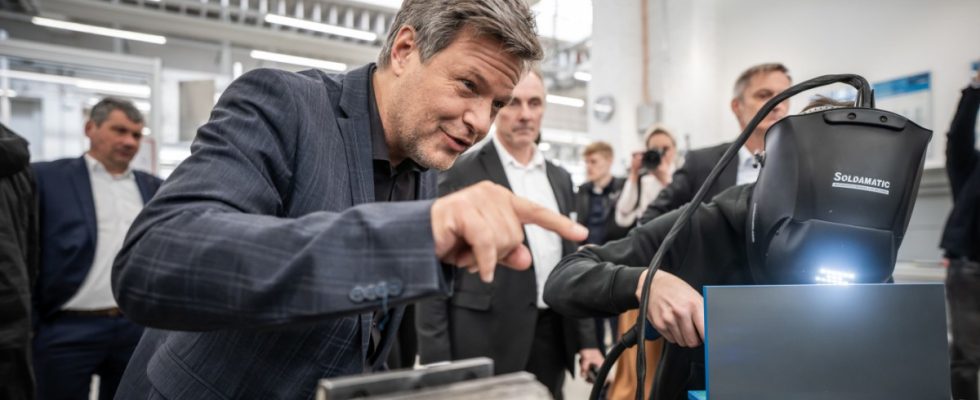It doesn’t take long for Robert Habeck to get to the point on Tuesday in Berlin. “If my party is good, it’s a party of change,” says the Green Economics Minister on a small stage in the ABB industrial group’s training center on the outskirts of the capital. “And I think they’re really good right now,” he says in front of the managers.
Wherever Habeck appears these days, the restructuring of the economy is quickly becoming a big issue. Whether it’s the energy industry or mobility: the traffic light coalition is pushing ahead with climate-friendly conversion. And that should continue like this, announces Habeck. “We have to turn a social economy into a socio-ecological one,” says Habeck. The task of the Greens is to focus this debate now.
So far, however, the problem for the Green Minister has been that he often raises resistance from business. Because the industry was often far less enthusiastic about his plans than the minister himself. Regardless of whether it was the conversion of mobility or the implementation of the accelerated phase-out of nuclear power: Habeck met with some skepticism.
At the performance on Tuesday, however, many things were different. Because instead of a murmur, Habeck received applause this time. Mostly like-minded people were present. Because top politicians from the Greens and business came together in the industrial plant to start the new economic association of the Greens, which sees itself as a support group. “We want to build a bridge from business to politics,” says CEO Thomas Fischer, head and founder of the management consultancy Allfoye in Düsseldorf. They want to ensure that green politics become the engine of the economy.
The CDU/CSU and the SPD have had something similar for a long time
The Greens are doing what the CDU with the Economic Council and the SPD with the Economic Association have had for years. According to the statutes, the official purpose of the new association is the “promotion and implementation of sustainable politics in all three dimensions of ecology, economy and social affairs”.
The unofficial goal is likely to be to strengthen the Greens’ economic skills and improve relations with industry before the next elections. In surveys of economic competence, the party, which has not given up the dream of moving into the chancellor’s office, regularly ranks at the bottom, to its own chagrin. In a recent survey by the Wahlen research group, the Greens are the fourth strongest party with five percent approval behind the CDU (31 percent), SPD (15 percent) and FDP (8 percent).
The Greens want to change that. “We are a party that works for climate-neutral prosperity,” said co-party leader Omid Nouripour at the start of the association. Climate neutrality and prosperity would not work without the economy. Therefore, “well-oiled hinges are needed for the exchange of ideas”.
19 companies are there at the beginning – including some big names
The association starts small with 19 member companies, but with some big names on the list of supporters. Supporting members include Deutsche Telekom, Siemens, ABB, Google Germany, SAP, Aldi Süd, the Berlin waste management company Alba and the Vonovia housing group. Both companies and individuals can become members.
The association is also open to non-party members. He himself is not a member, said club boss Fischer. But climate change is a real threat and drives him to get involved.
The organization sees itself as independent. A loan of 120,000 euros offered by the Greens will probably not be needed, said Fischer. A political advisory board is to be led by party leaders Ricarda Lang and Nouripour. As a member, however, you cannot buy access to the top of the Green Party, Nouripour assures.
Anti-lobby organizations are still critical of the start. LobbyControl called for clear dividing lines on Tuesday and called on top representatives of the Greens not to take on any managerial roles in the association. Membership in an advisory board can also lead to conflicts of interest. The Economic Association of the Greens should also disclose its financing, even beyond the regulations of the lobby register. Which membership fees companies pay remained open on Tuesday.
A lot to talk about
The Greens did not just court the economy when the association was founded. As early as the federal election campaign, people were looking for proximity to sectors that are particularly affected by their own politics – such as chemical and steel companies that use a lot of energy. Chancellor candidate Annalena Baerbock even advocated a pact between industry and politics. The co-chair of the Greens parliamentary group in the Bundestag, Katharina Dröge, spoke of a great interest from business in dialogue with her party. The need for discussion is also an expression of a “need for a modern economic policy”.
The Greens in Berlin left no doubt that the Greens want to push the restructuring forward. “Stagnation is always the beginning of decline,” said Habeck. During the government of Chancellor Angela Merkel, climate targets were only agreed on in abstract terms, but it was never thoroughly decided what that meant in concrete terms. In reality, however, far too little has changed.

